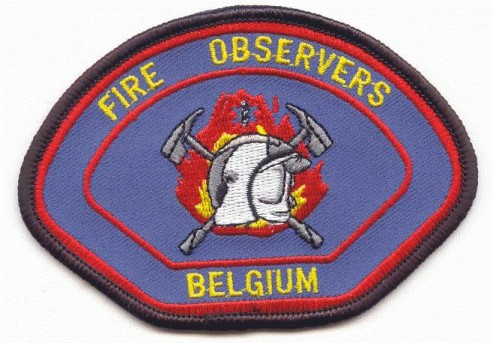FIRE OBSERVERS VZW: BELGIAN FIREFIGHTERS CONDUCT TRAINING IN THE U.S.

By Carl Verstrepen
Twenty years ago, a group of Belgian firefighters travelled throughout the Southwestern United States. This was a nice touristic trip that included San Diego, Los Angeles, Yosemite National Park, the Grand Canyon, and Las Vegas. Like any firefighter tourists, their cameras were taken out and operated to the fullest capacity when fire trucks drove by, and their rental cars came to a complete stop when there was a fire station to walk in and visit. One of those stations they stopped at was the Kern County Fire Department in Bakersfield, California. The group of Belgians was welcomed with open arms, and they got a great tour of the station, the apparatus, the equipment, and gear.
Our American brothers took a few Belgians for a ride and a call. This experience was very different from operations in Belgium, where fire stations were more like a prohibited territory for all non-department members.


In May 1996, a group of 12 Belgian firefighters spent a couple of days in the stations of the San Diego (CA) Fire Department. They rode out on calls, observed training, and talked about procedures and experiences. The Belgians "stole" knowledge with their eyes. On their flight back to Belgium, Marc Opstal, the organizer of this trip, decided with some other firefighters to create an organization scheduling these kinds of trips. From this idea, Fire Observers vzw was created in October 1996.
A NAME, OUR ORGANIZATION, AND ITS BOARD AND GOALS
The choice of an English name for the group was unanimous, although the search for a proper one was not that easy. Marc Opstal became the President for Fire Observers vzw, while a few participants of the San Diego trip joined the board in several other positions. (Vzw is the Belgian abbreviation for non-profit organization.) We chose to be a non-profit organization because we were not looking to operate for profit. This was also the easiest way to create an association and to legally operate under a very stringent Belgian law regarding organizations.
Over the years, a few things have changed within the Fire Observers vzw operation; the board was one of them. Today, Opstal is still president of the organization, but the other key role positions and board member positions were filled in by new blood.



The board consists of 11 members who work for the organization without receiving any compensation. Board members operate as program leaders; once we obtain the approval of a department to come over for a training program, the board members do the complete scheduling; administering; and booking of airline tickets, rental cars, hotels, and so on.
All our board members have been active within fire and rescue services for several years. They are a mixture from all ranks ranging from Firefighter to Chief, career and volunteer; they’re all licensed for emergency medical services and/or several special operations units.
From the inception of Fire Observers vzw, we have made it quite clear that these programs are not just a vacation. These are seven- to 10-day training programs followed by a few days of downtime, so touristic visits and beach time happen more toward the end of the trip. The actual program features a busy schedule of work-related visits, drills, classes, demonstrations, and station life including responding to all sorts of incidents. Our main goal is to let our members learn how U.S. fire departments are organized, how they train, and how they operate to learn more about their procedures and equipment and to exchange experiences and ideas. Then, we can take that knowledge back to Belgium and try to implement it in our departments and services as is appropriate. In addition to our main goal, we would like to let our members learn more about the United States of America, its history, the American Way of Life and, of course, the brotherhood.
OUR MEMBERS: 1996–2015
All our members need to be active within fire and rescue services. Ninety-four percent are career or volunteer firefighters with ranks ranging from Firefighter to Chief. Six percent are non-firefighting personnel active as instructors, emergency medical technicians, nurses at emergency medical services and emergency departments, lifeguards, or emergency dispatchers. Since 2001, we have also welcomed a large group of firefighters from the Netherlands. Today, we have more than 200 members within our organization.
In the early years of our existence, we kept the number of programs per year at two. Communication was not the same as it is today. Not everybody had access to the Internet, for example, so members joined our organization by word-of-mouth advertising.
Communication with the hosting departments also didn’t happen overnight. Because of the rising number of members, we now have offered four programs a year since 2012. We also started a program in Canada in 2013.


Once a program is published on our Web site, members can apply for it for approximately 30 days before the selection process starts. There are two lists—the first (1) is with members who have never joined a program before, and the second (2) is with returning members. Every program has 75-percent vacant spots for members for list 1 and 25 percent for list 2. Selection is based on list ranking.
In October 2015, a group of 10 Belgian Fire Observers were hosted by the Mobile (AL) Fire–Rescue Department for a training program. It was the second time having a program in Mobile; a very successful program was run in May 2007. The Mobile 2015 program was the 50th project organized by Fire Observers vzw! These 50 programs have brought more than 550 firefighters from Belgium and The Netherlands over to U.S. fire departments to observe, train, and share knowledge.
The list of hosting departments is long and distinguished. Others include San Diego, Fresno, Sacramento, Phoenix, Dallas, Houston, Austin, Oklahoma City, New Orleans, Nashville, Mobile, Jacksonville, Miami-Dade, Palm Beach County, Atlanta, Richmond, Norfolk, Washington DC, Fairfax County, and Detroit. Numerous departments have hosted us more than once.


For 2016, we have again four very exciting programs on the itinerary with hosting departments including Miami-Dade, Houston, Long Beach, and Phoenix. A total of 44 Fire Observers will be participating in these programs.
WHAT DOES A TRAINING/RIDE ALONG PROGRAM LOOK LIKE?
Our group looks for fire departments big and busy enough to host a group of 10 to 14 Fire Observers for approximately one week. Our members will be assigned to the busiest units and stations in town and will be participating in daily station life like apparatus and gear checks, cleaning and house duties, classes and drills, physical workouts, groceries and cooking, and (of course) responding to various incidents.
During the program, we schedule many work-related visits as well. For example, we will visit the emergency operations center, the fire academy, the fire museum (if one exists), the U.S. Coast Guard, fire apparatus constructors, and trauma centers.
We also try to squeeze in a couple of classes, drills, or demonstrations like live fire drills, high-angle rescues, confined space rescues, hazmat incidents, SWAT medics, trauma helicopters, swift water rescues, ARFF, marine firefighting, and so on.
We always have a good time, but these programs are not vacations, and our members know that. There exists a very high standard; this is a 100-percent active program with very few hours of downtime.
While in the stations, our members can be assigned to engines, trucks, chiefs, medic units, and special operations units. When responding to any and all incidents, our members stay in an observing role. However, we have had several departments put us to work on actual incidents. Some involve us with their exterior operations such as fires, extrications, medical assistance, and rescues. Others have added us to interior fire and roof operations as well.
OUR SUCCESS
It has been proven that these programs are a success! The mixture of training and tourism in a high-standard organization results in an increasing number of members joining and the increasing number of applications received for each program. For the 32 vacant spots in the 2015 programs, we received more than 60 applications.
Since we are a non-profit organization that is not linked to any federal or local government or to any other department or agency, we do not receive any grants or financial help. All our members and board members need to pay for their own expenses like flights, rental cars, fuel, hotel/lodging, tourist activities, and insurance; they even need to take time off from work. Members apply on a voluntary basis and, needless to say, they are highly motivated to participate in these programs.

More information about our organization and programs can be found on our Web site at https://www.fireobservers.org.
Carl Verstrepen has been active within fire and emergency medical services since 1996 and has held several positions in four different departments and agencies. He joined Fire Observers vzw in 2004 and became a board member shortly after. He is its CFO and public information liaison since 2014.



